-
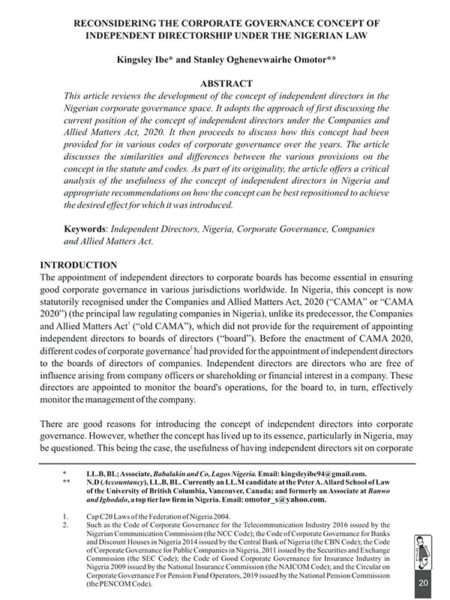
Reconsidering the Corporate Governance Concept of Independent Directorship Under Nigerian Law
0₦2,500.00Kingsley Ibe, Associate at Babalakin & Co and Stanley Omotor, formerly of Banwo and Ighodalo and now an LL.M candidate at the Peter A. Allard School of Law of the University of British Columbia, Canada, in their article, Reconsidering the Corporate Governance Concept of Independent Directorship Under Nigerian Law, note that the concept of independent directorship is now statutorily recognised under the Companies and Allied Matters Act, 2020. Ibe and Omotor review the development of the concept of independent directors in the Nigerian corporate governance space. They examine the regulatory framework for independent directors in Nigeria, the various corporate governance codes, the similarities and differences between the various provisions in the statute and codes. They offer a critical analysis of the usefulness of the concept of independent directors in Nigeria, and recommendations on how the concept can be best repositioned to achieve the desired effect.
-
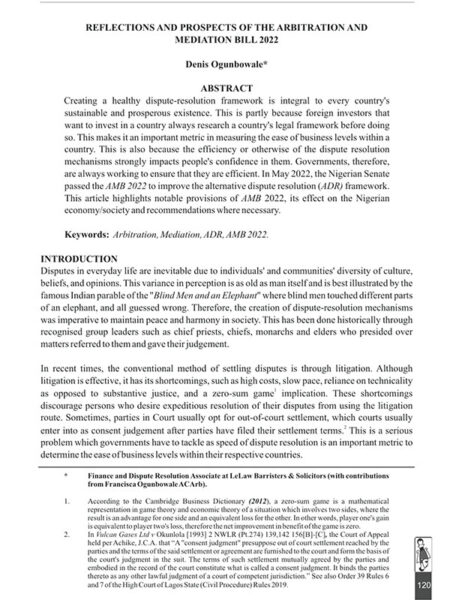
Reflections and Prospects of the Arbitration and Mediation Bill (AMB) 2022
0₦2,500.00Denis Ogunbowale of LeLaw Barristers & Solicitors reflects on the Arbitration and Mediation Bill, 2022, in his article, Reflections and Prospects of The Arbitration and Mediation Bill (AMB) 2022. He observes that creating a healthy dispute resolution framework is integral to every country’s sustainable and prosperous existence. He notes that the efficiency or otherwise of the dispute resolution mechanisms strongly impacts people’s confidence in them. In May 2022, the Nigerian Senate passed the AMB 2022 to improve the alternative dispute resolution (ADR) framework. Ogunbowale highlights notable provisions of AMB 2022, the likely effect on the ADR landscape, and the drawbacks of the Bill.
-
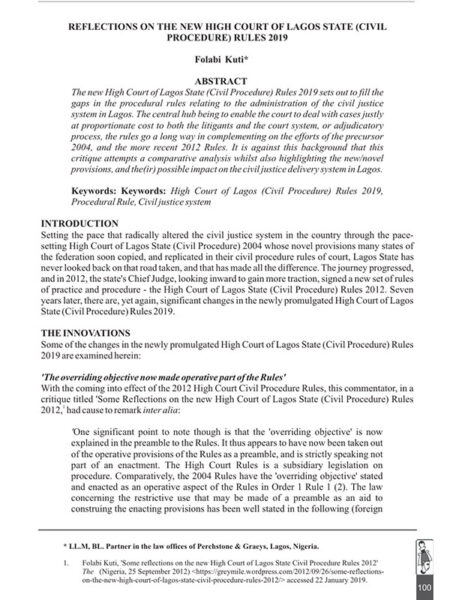
Reflections on the New High Court of Lagos State (Civil Procedure) Rules 2019
0₦2,500.00Folabi Kuti, Partner, Perchstone & Graeys Lagos Nigeria in Reflections on the New High Court of Lagos State (Civil Procedure) Rules 2019, undertakes a comparative analysis of the Civil Procedure Rules of 2012 and 2019, highlighting the novel changes in the new Rules and the likely impact on the civil justice delivery system in Lagos State.
-
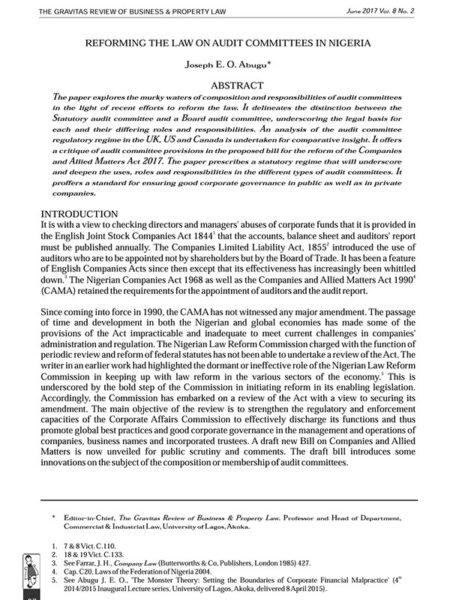
Reforming the Law on Audit Committees in Nigeria
0₦2,500.00Professor Joseph Abugu,Editor-in-Chief, The Gravitas Review of Business & Property Law and Head of Department, Commercial & Industrial Law, University of Lagos in his article “Reforming the Law on Audit Committees in Nigeria” against the background of the proposed bill for the reform of the Companies and Allied Matters Act 2017, explores the murky waters of composition and responsibilities of audit committees and delineates the distinction between the Statutory audit committee and a Board audit committee, underscoring the legal basis for each and their differing roles and responsibilities. He concludes with an analysis of the audit committee regulatory regime in the UK, US and Canada for comparative insight.
-
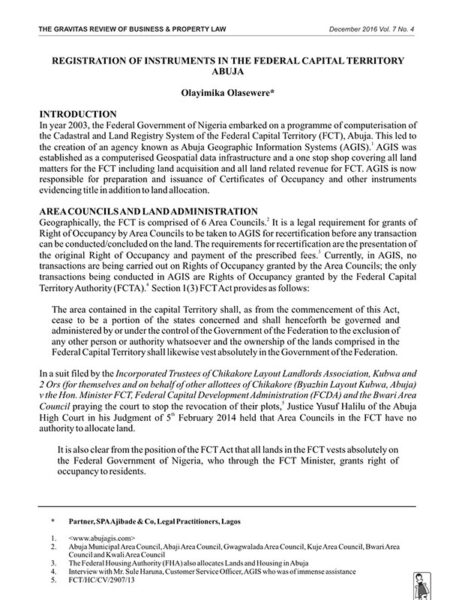
Registration of Instruments in the Federal Capital Territory, Abuja
0₦2,500.00Olayimika Olasewere, Partner, SPA Ajibade & Co., Legal Practitioners, gives a practical guide on registration of title in Abuja in his article “Registration of Instruments in The Federal Capital Territory Abuja”.
-
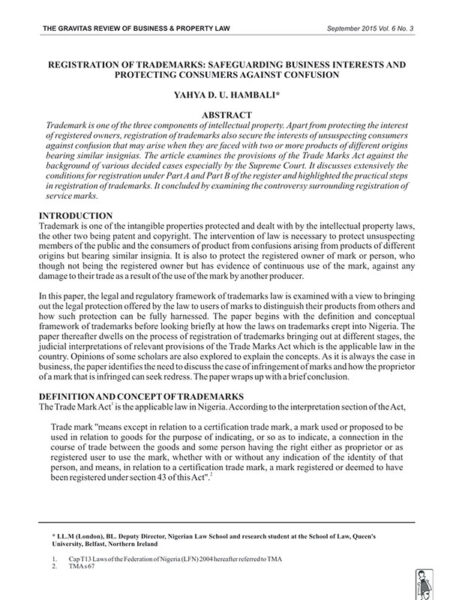
Registration of Trademarks: Safeguarding Business Interests and Protecting Consumers against Confusion
0₦2,500.00Yahya Hambali, Deputy Director, Nigerian Law School and research student at the School of Law, Queen’s University, Belfast, Northern Ireland, examines the provisions of the Trade Marks Act through decided cases and gives a practical guide on registration of trademarks.
-
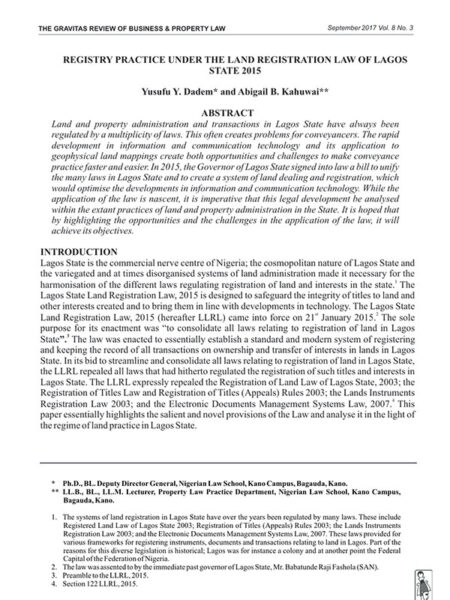
Registry Practice under the Land Registration Law of Lagos State 2015
0₦2,500.00Dr. Yusufu Dadem, Deputy Director-General, and Abigail Kahuwai, Lecturer at the Nigerian Law School, Kano Campus in their paper “Registry Practice under the Land Registration Law of Lagos State 2015” examine the Land Registration Law of Lagos State(LLRL) which repealed the Registration of Land Law of Lagos State, 2003; the Registration of Titles Law and Registration of Titles (Appeals) Rules 2003; the Lands Instruments Registration Law 2003; and the Electronic Documents Management Systems Law, 2007. Dadem & Kahuwai note that the variegated and disorganised systems of land administration made the LLRL imperative, for harmonisation of the different laws regulating registration of land and interests in the state. They analyse the provision of the law with respect to registration of interests, land register, records, and use of forms for transaction.
-
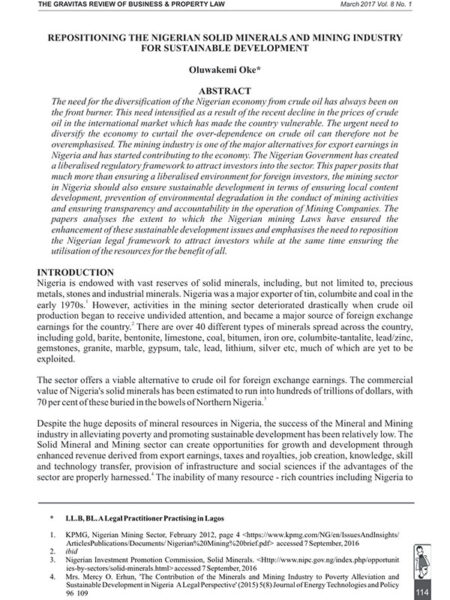
Repositioning the Nigerian Solid Minerals and Mining Industry for Sustainable Development
0₦2,500.00Oluwakemi Oke, Lagos-based legal practitioner in her article “Repositioning the Nigerian Solid Minerals and Mining Industry for Sustainable Development” explores the legal and regulatory framework of the Nigerian mining sector. She analyses local content development and participation, environmental protection and the role of the Nigerian Extractive Industries Transparency Initiative (“NEITI”) in ensuring transparency and accountability in the mining sector.
-
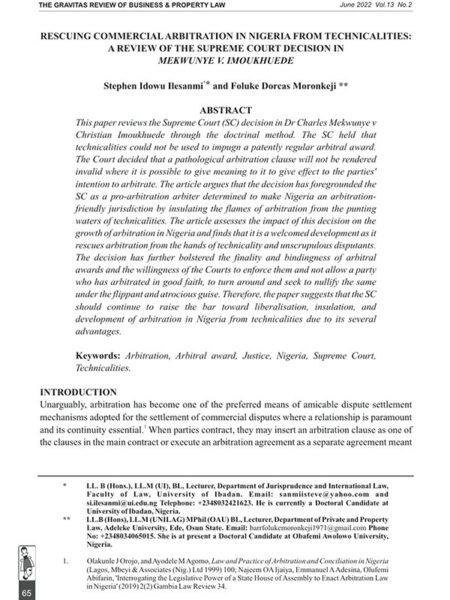
Rescuing Commercial Arbitration in Nigeria from Technicalities: A Review of the Supreme Court Decision in Mekwunye v Imoukhuede
0₦2,500.00Stephen Ilesanmi, Lecturer, University of Ibadan Nigeria and Foluke Moronkeji, Lecturer, Adeleke University Ede Nigeria, in their article, Rescuing Commercial Arbitration in Nigeria from Technicalities: A Review of the Supreme Court Decision in Mekwunye v Imoukhuede, review the Supreme Court’s (SC) decision in Mekwunye v Imoukhuede where the SC held that technicalities could not be used to impugn a patently regular arbitral award. The Court held that an arbitration clause would not be rendered invalid where it is possible to give meaning to it to give effect to the parties’ intention to arbitrate. Ilesanmi and Moronkeji argue that the SC decision has rescued arbitration from technicalities. They note that the decision has further bolstered the finality and bindingness of arbitral awards and the willingness of the Courts to enforce them and not allow a party who has arbitrated in good faith, to turn around and seek to nullify the same under flippant and atrocious guises.
-
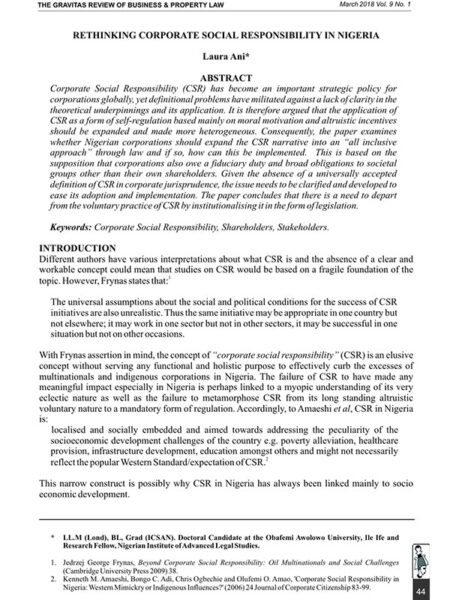
Rethinking Corporate Social Responsibility in Nigeria
0₦2,500.00Laura Ani, Research Fellow, Nigerian Institute of Advanced Legal Studies, in her article, “Rethinking Corporate Social Responsibility in Nigeria”, argues that the application of CSR as a form of self-regulation based mainly on moral motivation and altruistic incentives should be reappraised. She examines the Shareholder Primacy and Stakeholder Communitarianism approaches to CSR, the statutory framework for CSR in Nigeria and how other jurisdictions have treated the issue of CSR. She concludes that there is a need to depart from the voluntary practice of CSR by institutionalising it in the form of legislation.
-
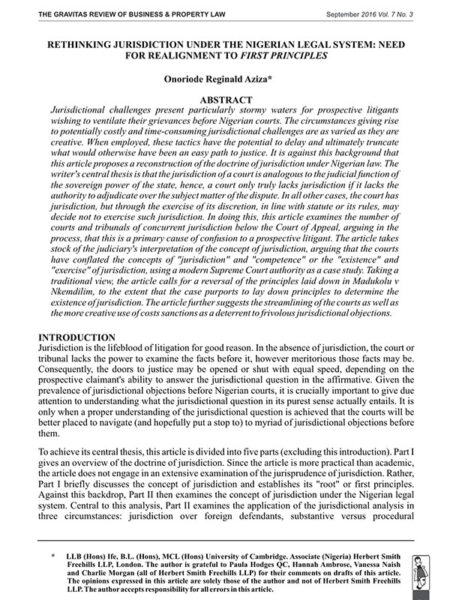
Rethinking Jurisdiction under the Nigerian Legal System: Need for Realignment to First Principles
0₦2,500.00Onoriode Aziza, Associate (Nigeria) at Herbert Smith Freehills LLP, London in “Rethinking Jurisdiction under the Nigerian Legal System: Need for Realignment to First Principles” argues that the jurisdiction of a court is analogous to the judicial function of the sovereign power of the state, hence, a court only truly lacks jurisdiction if it lacks the authority to adjudicate over the subject-matter of the dispute. In all other cases, the court has jurisdiction, but through the exercise of its discretion, in line with statute or its rules, may decide not to exercise such jurisdiction. He examines the number of courts and tribunals of concurrent jurisdiction below the Court of Appeal and takes stock of the judiciary’s interpretation of the concept of jurisdiction, arguing that the courts have conflated the concepts of “jurisdiction” and “competence” or the “existence” and “exercise” of jurisdiction, using the Supreme Court decision in Agip Nigeria Limited v Agip Petroli International and Others as a case study. He calls for a reversal of the principles laid down in Madukolu v Nkemdilim, to the extent that the case purports to lay down principles to determine the existence of jurisdiction.
-
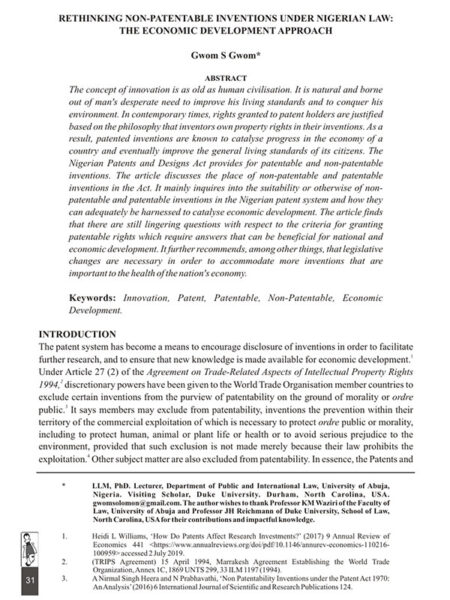
Rethinking Non-Patentable Inventions under Nigerian Law: The Economic Development Approach
0₦2,500.00Dr Gwom Gwom of the Department of Public and International Law, University of Abuja Nigeria in his article, Rethinking Non-Patentable Inventions under Nigerian Law: The Economic Development Approach, reviews the legal and regulatory regime of Patents in Nigeria. He examines the criteria for patentability of an invention; inquire into the suitability or otherwise of patentable and non-patentable inventions in the Nigerian Patent System; posit that there are still lingering questions with respect to the criteria for granting patentable rights which require answers that can be beneficial for national and economic development; and conclude that legislative changes are necessary in order to accommodate more inventions that are important to the health of the nation’s economy.
The Gravitas Review of Business & Property Law



